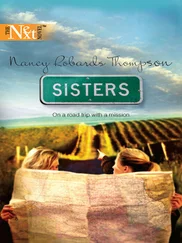Between spoonfuls of savory soup and bites of buttery croissant, I told Francesca my plans for the afternoon. “I’m not sure how long I’ll be, and I don’t want to be late for the boys’ next meal the way I was yesterday, so . . . Would you mind coming along? I know it’ll be a lot of trouble, loading Will and Rob into the car and all, but . . .”
Francesca’s dark eyes gleamed. “I’ve run eight kiddies to the Sleepy Hollow Farm Park and back any number of times. I think I’ll be able to manage a pair of lamb chops like Rob and Will.”
I looked down at my empty bowl, remembering the agonized hours I’d spent preparing for the six-mile (roundtrip) journey from the cottage to Saint George’s for the boys’ christening. I felt limp with inadequacy.
“I’d just as soon not bring the boys into the tearoom, though,” Francesca added. “Wouldn’t want to bother Mrs. Pyne’s other customers. I’ll sit with ’em up at Saint George’s churchyard, if you like. You could meet us there when you’ve finished.”
I nodded my agreement. None of the churchyard’s customers would complain if the boys decided to exercise their right to free speech. “I’ll get the keys to the Mercedes. The Mini’s backseat isn’t big enough for—”
“You’ve reminded me . . .” Francesca interrupted. She reached into her apron pocket. “I found this in a ratty old plimsoll at the back of the linen cupboard. Thought you might’ve misplaced it. D’you know what it’s for?”
I gazed at the key resting in Francesca’s palm and blushed to my roots. “Yes,” I admitted. “It unlocks the padlock on the, um, bathroom cabinet.”
“Clever of you to hide it,” Francesca commented. “Can’t be too careful where little ones and medicine chests are concerned. I could tell you stories. . . .” She gazed at my bambinos and pocketed the key. “I’ll put it right back where I found it.”
I nearly wept into my soup. At last! I’d done something right!
Francesca took the wheel of the Mercedes while I kept an eye on the boys in the backseat. They dozed as soon as the engine started, and were fast asleep by the time we reached the humpbacked bridge.
It was another warm and sunny day, without a breath of wind to stir the willows on the green, but the square was—by Finch’s standards—a beehive of activity. Christine and Dick Peacock were hosing down the pub’s windows. Able Farnham, the aged greengrocer, was restocking his outdoor bins. Mr. Barlow, who garaged my cars when I was back in the States, was out walking Buster, his yappy terrier.
Bill’s bicycle was propped in its customary place among the wysteria, and the paneled van was parked in front of the village school. The schoolhouse doors were firmly shut, however. Katrina and Simon were apparently heeding my advice and keeping a low profile.
Peggy Kitchen, on the other hand, had decided to make a statement. An array of Union Jacks had sprouted overnight from the front of her shop, and the display window, which usually featured a humble pyramid of baked-bean cans, now trumpeted an urgent call to arms. A hand-lettered sign placed strategically above a portrait of the queen shouted: SHE WANTS YOU TO SIGN THE PETITION! But only a tourist would think that she referred to Elizabeth II.
“Good grief,” I said, dazzled by the display.
“Stupid woman,” said Francesca. “Everyone knows the bishop won’t heed her silly petition.”
“Why not?” I asked.
“The bishop’s daft about Roman ruins,” Francesca replied. “Everyone knows that.”
“Peggy doesn’t,” I pointed out.
Francesca tossed her head dismissively. “You could fill a barn with what Mrs. Kitchen doesn’t know about Finch.” Her gaze drifted away from Peggy’s declaration of war, and her eyes narrowed slightly. “Now there’s something I didn’t know about.”
I followed her gaze and saw, to my dismay, that the tearoom was closed. The door was shut, the windows were shrouded in bedsheets, and the freestanding slate sandwich-board that served as both sign and daily menu wasn’t teetering in its usual spot on the cobbles.
“ Tearoom’s closed for renovation,” Mr. Barlow called from across the square.
Francesca frowned. “Why’s Mrs. Pyne bothering with that? I liked the tearoom as it was.”
I, too, had been fond of the tearoom’s disarming flea-market decor—the mismatched chairs, the rickety tables, the astonishing variety of chipped china. I wondered what would replace it.
“No point in it,” Francesca went on sourly. “She only set up shop three years ago. No need for her to be rearranging things now.”
I blinked. “Sally Pyne’s not from Finch?”
“Lord no. She came here from Plymouth, to be nearer her son and daughter-in-law.” Francesca glanced at the boys, who were still snoozing in their car seats, lulled by the idling engine. “Back to the cottage?”
“No . . .” I hated the thought of going home empty-handed. Bill would return from the pub, great with gossip, and I wouldn’t have a crumb to contribute. “I think I’ll stop by the Emporium. Want to come along?”
“And disturb the bambinos?” Francesca shook her head. “I’d sooner wait for you in the churchyard. See you in”—she checked her watch—“one hour?”
“I’ll be there.” I waved Francesca off, then squatted to greet Buster, who, unleashed by Mr. Barlow, had raced over to sniff at my sneakers.
“Mornin’, Lori.” Mr. Barlow coiled Buster’s leash around his hand as he approached. “Nothing wrong with the Mini, I hope.”
Mr. Barlow was a retired mechanic who’d come to regard my Mini as a dependable pension supplement. He never failed to ask after its health.
“The Mini’s fine,” I assured him. I picked up the rubber ball Buster had dropped at my feet and nodded toward the pub. “The Peacocks are industrious this morning. I don’t think I’ve ever seen them hosing down the pub before.”
“They’re not just cleaning it,” Mr. Barlow informed me. “ They’re renaming it and putting up a new sign.”
“Foolish nonsense.” Old Mr. Farnham had joined us, teetering precariously across the cobbles from his greengrocer’s shop. “Pub doesn’t need a sign. Everyone knows it’s Peacock’s pub.”
“It’s that wife of Dick’s,” Mr. Barlow explained. “She’s full of queer ideas.” He leaned toward me. “She reads science fiction, you know.”
“ There’s nothing wrong with reading science fiction,” I protested.
“Not when you know it’s fiction,” retorted Mr. Barlow. “Christine Peacock thinks it’s all true!”
“Too bad that son of hers joined the army instead of the space program,” said Mr. Farnham. “He could’ve given his mum a lift in his rocket ship.”
I smiled thinly at the mean-spirited little joke, then tossed Buster’s rubber ball in the direction of the tearoom. “What do you suppose Sally Pyne is up to?”
“ Turning the tearoom into a juice bar, probably,” said Mr. Farnham. “You know Sally—always trying to lose weight. Fat lot of good it’s ever done her.”
“I heard she’s doing it up Roman,” said Mr. Barlow, “on account of that chap at Scrag End field. Sally thinks his dig’ll pull in tourists.”
“Delusions of grandeur,” Mr. Farnham scoffed. “There’s never been tourists in Finch and there’ll never be tourists in Finch.”
Mr. Barlow nodded his agreement. “Folks may come here to live, but they don’t come just for visits.”
I turned to Mr. Barlow. “Did you move here from somewhere else?”
He nodded again. “Came from Bristol, same as Jasper Taxman. Why do you ask?”
“I was just wondering.” I was wondering if anyone had been born and raised in Finch. The Buntings were from London, Sally Pyne was from Plymouth, Mr. Barlow and Mr. Taxman were from Bristol. Even Peggy Kitchen, the empress herself, had moved to Finch from Birmingham.
Читать дальше








